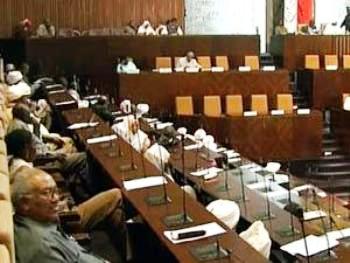Sudan’s draft 2014 budget to go before parliament for approval
December 16, 2013 (KHARTOUM) – The Sudanese cabinet has approved the 2014 budget presented by the newly appointed minister of finance Badr Al-Deen Mahmoud in a session chaired by president Omer Hassan Al-Bashir on Monday.

He stressed that the new budget does not include any new taxes or other price increases, stressing that 64% of the savings gained from lifting fuel subsidies would be allocated to raising wages and salaries, with another 22% directed to social subsidies, including support for poor families, healthcare, health insurance and students.
Last September, the Sudanese government launched a new austerity package which included lifting fuel subsidies which almost doubled prices of gasoline and diesel. The cabinet also raised the US dollar exchange rate to 5.7 Sudanese pounds (SDG) compared to the previous rate of 4.4
The minister further said that the budget focuses on development, with support to be directed to productive sectors, including agriculture, noting that the budget doesn’t exceed 1.5% of the Gross Domestic Product (GDP).
He added that the budget aims to expand the tax umbrella through improving the collection efficiency of the Sudan Taxation Chamber (STC), affirming that the ministry of finance would be the sole government body with control over public funds.
Previous budgets saw the phenomenon of government units retaining money that should otherwise be sent to the ministry of finance.
The controversial practice sparked national debate regarding the constitutionality of withholding public money by various government units, given that the ministry of finance is the only body which has the legal mandate to collect and disburse government funds.
Mahmoud said the budget also aims to reduce public expenditure through curbing spending on foreign trips, government buildings and imported furniture, as well as government demand for foreign exchange.
There are also moves to increase foreign exchange reserves, particularly after the recent increase in foreign exchange flow.
Mahmoud said the budget seeks to stabilise the exchange rate and increase financial resources, as well as achieving social justice through improving living standards, expanding public health insurance coverage, and directly supporting lower income sectors and students.
The finance minister said that the budget wants to achieve a 2.6% growth rate and 16.6% increase in money supply in order to reach 20.9% inflation rate.
He said that the budget would create a surplus for the first time in many years, attributing the increase in revenues to the expansion of the tax umbrella and transit fee revenues from the transfer of South Sudanese oil through Sudanese territory.
Mahmoud further emphasised his ministry’s commitment to include the increase in minimum wages in the budget, as well as paying wage arrears retrospectively from January, 2013, according to an agreement concluded with the Sudanese Workers Trade Unions Federation (SWTUF).
Meanwhile, the Sudanese parliament suspended its sessions on Monday and Tuesday after the council of ministers failed to send the 2014 budget proposal. Sessions later resumed on Wednesday.
The official news agency SUNA quoted the parliament press office as saying that the 2014 budget proposal was due to be delivered to the parliament by Monday.
Last week, a new parliamentary speaker and deputy speaker were appointed as part of a recent cabinet reshuffle carried out by the ruling National Congress Party (NCP) in its executive and legislative quota.
In a statement to parliament on Thursday, newly appointed speaker Al-Fatih Izz Al-Deen said that the next major priority of the legislative body is to draft a constitution based on national consensus and to amend the elections law, stressing that they look forward to having a constitution that emerges through national consensus.
(ST)
